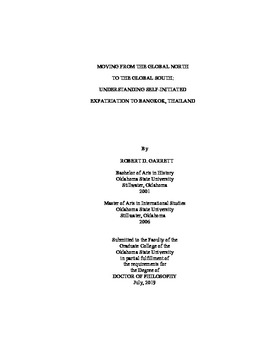| dc.description.abstract | Globalization and advances in technology have led to an overall increase in the complexity and intensity of global mobility. Most of this mobility is from low-income to high-income countries, or from poor countries to richer ones. However, another form of mobility that has received attention from scholars is the movement of Westerners, colloquially referred to as expatriates, who relocate from relatively affluent and developed countries in the Global North to less developed countries in the Global South. In this dissertation, I focus on self-initiated expatriation to the Global South. Specifically, I examine the movement of working-age Westerners who relocate to Bangkok, Thailand under their own direction. I employ qualitative inquiry and use semi-structured interviews, convenience interviews, as well as participant observation, to investigate the lives and experiences of U.S. and U.K. self-initiated expatriates (SIEs), who relocated on their own in order to live and work in Bangkok, Thailand. By using postcolonial approaches, transnationalism, as well as integration and acculturation theories I unpack the perceptions of participants in this study, and examine the implications their mobility has on Thai society. Results from this study show that mobility from the West combined with the economies in the Global South produce relationships of imbalanced power, which tend to favor white, male Western SIEs. Additionally, I show that Westerners occupy a precarious position in Thailand, because, despite being considered outsiders, from the Thai perspective they are seen as the superior "other," in regards to their skin color, material wealth, technology, and education. Because of this perception, which is a legacy of orientalism, Western SIEs enjoy a relatively high socio-cultural status in Thailand. Consequently, Western SIEs are easily able to acquire jobs and romantic partners, and enjoy a higher standard of living when compared to their home countries. Subsequently, Westerners are mobilizing the colonial past, and expatriating to Thailand, as well as other countries in the Global South. In summary, this dissertation shows, that from a postcolonial perspective, self-initiated expatriation to Thailand is in a sense a continuation of colonial modes of mobility, which privileges Westerners and perpetuates unequal relations and understandings of the world. | |
